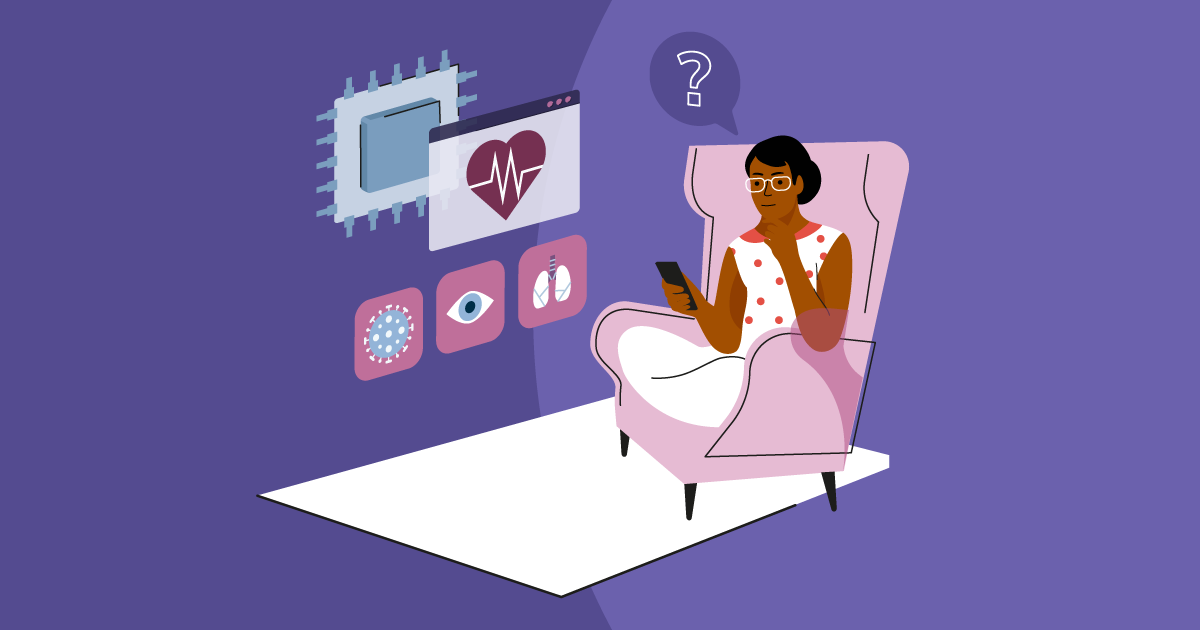AI in healthcare in the UK: uses, challenges and future benefits
Published on 01/06/2023 Written by Sukanya Awasthi and David Jani.
This article was originally published on 11/11/2021
Artificial intelligence (AI) applications are on the rise in the healthcare sector, and given the current boom in AI tools, this seems likely to grow. Despite the growing trend and the UK Government’s promise of £36 million in investment in artificial intelligence research in the NHS, AI is still a very new technology. There are significant advantages and disadvantages of using AI in healthcare to be addressed as these systems become more common.

In this article
Of course, implementing the use of artificial intelligence in healthcare is a significant undertaking, but it is something which could prove highly beneficial long term for both large and small healthcare providers. However, it must be managed safely and correctly to ensure it succeeds in the long term.
In this article, we will explore the uses, benefits, and challenges of using artificial intelligence in medicine and the healthcare industry.
The role of AI in UK healthcare
AI has the potential to contribute significantly to the NHS and, thus, to the overall healthcare industry in the UK.
Matthew Gould, the National Director for Digital Transformation of NHS England, believes that the UK can become a global leader in AI-powered healthcare and emphasises artificial intelligence's capacity to improve patients' medical outcomes. A major project in achieving this has been the creation of an NHS AI Lab.
The lab was established in 2019 and brings together the UK Government, healthcare providers, and technology firms interested in developing AI-enabled solutions to improve patients' lives. It offers various programmes throughout the year and allocates to identify, fund and support the rapid evaluation and approval of promising AI initiatives within the British healthcare system.
How is AI used in healthcare?
AI can enhance the outcomes of medical procedures while saving money by lowering the time employees spend on repetitive tasks. AI systems are becoming more capable of understanding human emotions, which may have resulted in greater adoption in the healthcare sector. Some of the advantages of AI in healthcare can be seen below.
Analysing large data sets for better diagnoses
AI software can help hospitals and other medical centres process large amounts of data more efficiently. AI algorithms have the potential to not only read large data sets but also to analyse that data and then offer insights to medical professionals and highlight anomalies.
Robot-assisted surgery
AI also contributes to the healthcare industry through AI-enabled robots that can perform surgeries. These robots are precise and have in-built arms, cameras, and other required instruments that can perform medical procedures with a significant degree of accuracy. Some AI-powered robots may also be able to process patient data and evaluate it to make well-informed surgical decisions.
Virtual nursing assistance
AI-enabled virtual nursing assistants may have the capability to read the patient’s data, medical history, symptoms, and other vital information to infer the most likely diagnosis and provide remote support. Some virtual assistants could also potentially monitor the patient’s condition and book appointments with their doctor.
Disadvantages of AI in healthcare
Despite the promise of potential use cases, artificial intelligence in healthcare still has a few technological challenges associated with it. Likewise, there are ethical concerns, such as worries that AI systems could take away healthcare workers’ jobs in the future.
These challenges and other issues must be considered before widespread adoption becomes a reality. Two distinct challenges faced by the healthcare industry while using AI systems are explored in the following paragraphs.
Lack of proper data management
Data management is one of the biggest challenges associated with AI technology in hospitals. In order to make the correct inferences about a data set, accurate data must be fed into the system.
Yet data entry isn’t always a perfect process. If cases of human error occur and the data entered in the system has blank or erroneous values, the AI tool will not be able to generate the desired results. Cleaning, sorting, and consolidating data is also something that healthcare providers could struggle with.
Did you know?
Checking data for errors is a detailed process which can be made easier with the help of data cleaning tools. These offer a software solution to ensure quality control is maintained and that inaccurately entered and incomplete data is removed from the final set.
Risk of data leaks and fraud
Another challenge associated with using artificial intelligence applications in healthcare is the proper storage and security of data such as medical records. Hosting patient data in the cloud could likely make it more susceptible to attempted cyber hacks and frauds, and hackers may demand hefty ransom to return or replace such sensitive data, adding to the need to secure stored data adequately.
The future of healthcare using AI
AI in medicine carries a lot of potential to improve the healthcare system. It offers significant benefits that could transform the global healthcare landscape. With support from the government, AI-enabled systems are expected to become more refined and accurate in the future and may help healthcare become more accessible to a greater number of people.
This article may refer to products, programs or services that are not available in your country, or that may be restricted under the laws or regulations of your country. We suggest that you consult the software provider directly for information regarding product availability and compliance with local laws.

